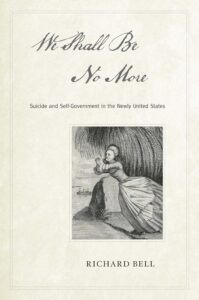We Shall Be No More: Suicide and Self-Government in the Newly United States – Richard Bell
 We Shall Be No More: Suicide and Self-Government in the Newly United States. By Richard Bell. (Cambridge: Harvard University Press, 2012. Cloth $49.00.)
We Shall Be No More: Suicide and Self-Government in the Newly United States. By Richard Bell. (Cambridge: Harvard University Press, 2012. Cloth $49.00.)
We Shall Be No More chronicles who had the right to control the narrative of death and even the event of death itself in the early republic and antebellum America. The newly minted United States viewed suicide to be a symptom of the nation’s loss of control over its citizens, as the state and religion sought to maintain a monopoly on violence. Some of these arguments and tactics of moral suasion remain with us today in the form of debates over the death penalty (also discussed by Bell – suicides of convicted criminals robbed the state of the power to prosecute and control violence) or the fear that mass media was corrupting youth and glorifying suicide. Bell covers a large range of groups interested in preventing suicide, writing:
Whether the setting is the jail or the plantation, the salon or the sitting room, the revival meetings or the asylum, the true subject here is power: the power of parents over children, of masters over slaves, of the state over inmates, of ministers over their followers, of authors over readers, and even medical science over God. (41)
This is a narrative told from the point of view of those groups wanting to stop suicide and how they viewed the sin or reprobation of those who committed it. And those who reported on suicide walked a fine line between neutral reporting and sensationalism. Parents, religious leaders, politicians, abolitionists, and others all used suicide in various ways to try to manipulate their own agendas. It all came down to who could control and dictate the narrative of suicide.
For a book on such a sensitive topic, Bell avoids sensationalism to provide a matter of fact narrative about the role of suicide in the early republic and antebellum periods. Suicide served as a counterpoint to various groups’ claims of mastery over their followers and had to be manipulated to demonstrate strengths of some of these groups. As in the case of the battle between the Universalists and evangelicals over whose religion provoked more damning instances of suicide, suicide could be used as a weapon to denigrate those competing for power.
This was an interesting book, and it seems to me to provide an enriching supplement to works seeking to explore the uncertainty of the political experiment that was democracy in America. As I have mentioned before, who got to control the narrative? Suicide in this book can be seen as a way to reject that narrative and rewrite it in an independent form. It was subversive, whether intended to be that way or not. Bell makes a good case for this argument, though sometimes he strays into simple history and forgets to pull the string of suicide in until the last minute. There is a balance to be made here between contextualizing his subject and actually analyzing it and creating and argument.
The chapter on abolition was especially striking, and it made me question what we could learn about suicides if slave voices had been left in the record. This book focuses on who tried to control suicide, not those who attempted it (and succeeded), and again, this might be a lack of available sources. But I think if those sources could be found (and indeed, Bell does give examples of suicide notes) we would have a more well-rounded picture of those who chose to take their lives. It all comes down to a basic question: who had agency here? Bell sees this as a battle between those who constructed the dominant narrative and the suicides that disrupted or undermined it. Perhaps the answer is a sequel that moves forward in time, that examines how suicide played a role in postbellum America. Either way, this book adds an important examination of the role of suicide to the history of the first 50 years of American history, providing evidence of yet another contentious issue that the state struggled to control as it constructed a new nation.
